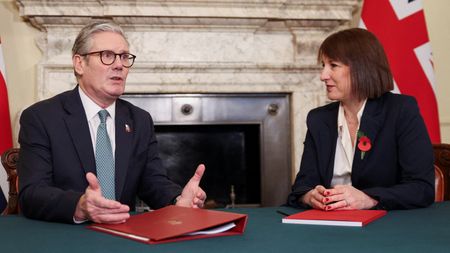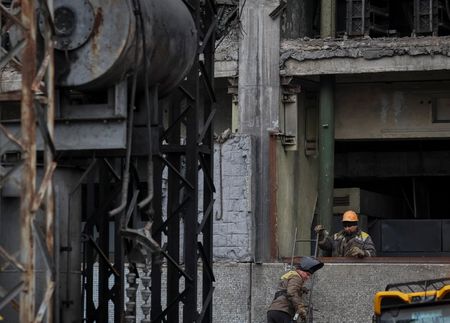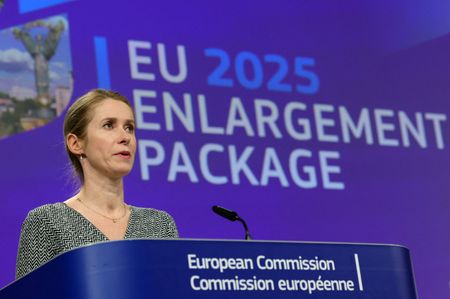By Andrew MacAskill, Alistair Smout and Kate Holton
LONDON (Reuters) -British finance minister Rachel Reeves has no plans to raise income tax rates in this month’s budget due to improved fiscal forecasts, a source said, following a surge in borrowing costs earlier in the day on reports she had backtracked on tax hikes.
Reeves is expected to need to raise tens of billions of pounds to stay on track for her fiscal targets, and her recent comment that “we will all have to contribute” was seen as paving the way for the government to break its main election pledge and hike income tax rates.
But the latest round of forecasts from the Office for Budget Responsibility pointed to an improving fiscal outlook, two sources familiar with the matter said, one of whom confirmed the government did not plan to raise income tax in light of those latest figures.
British government bond prices fell heavily with yields initially rising by more than 14 basis points across 20- and 30-year gilts. The jump in borrowing costs slightly eased later with yields up by nearly 10 basis points at 1030 GMT but were still on track for their worst day since July 2, when a tearful appearance by Reeves in parliament spooked investors. Ten-year borrowing costs – a better barometer for future gilt issuance – were up by 8 bps on the day at 4.56%, on track for their biggest daily rise since September 25.
A Treasury spokesperson declined to comment on tax policy.
“The chancellor will deliver a budget that takes the fair choices to build strong foundations to secure Britain’s future,” the spokesperson said.
Reeves had committed to making the public finances more resilient and to give herself enough fiscal room for manoeuvre to withstand turbulence in the global economy, they said.
MARKETS HAD TAKEN REASSURANCE FROM TALK OF TAX RISES
In recent weeks investors had taken reassurance from signals from Reeves that she was prepared to take tough measures to remain on course to meet her fiscal targets of balancing the government budget by 2029/2030, excluding investment spending, contributing to a drop in government bond yields. Bond yields move inversely to prices.
Investors have previously said they have more confidence in revenue forecasts based on increases in income tax, rather than a patchwork of smaller taxes which can be easier to avoid.
Economist Kallum Pickering at Peel Hunt said Reeves would now likely opt for a “haphazard patchwork of smaller anti-growth tax increases”.
“That would be a bad outcome,” he said. “It would add to uncertainty, further damage the government’s already tarnished credibility, and complicate any BoE judgement to potentially offset tax rises with rate cuts.”
One revenue-raising alternative for Reeves was to cut the thresholds at which people pay different rates of income tax.
Paul Johnson, a former director of the Institute of Fiscal Studies think tank, told BBC radio that such a move could raise large amounts of money for the Treasury but would disproportionately hurt lower-paid workers.
One source familiar with the matter said that no final decisions had been made, and there was still another round of OBR forecasts to come which could yet change fiscal estimates used for the budget.
THINK TANKS HAVE WARNED OF NEED TO RAISE MONEY
The National Institute of Economic and Social Research, a leading think tank, had warned that Reeves needed to embark on major tax rises to avoid a repeat of the loss of market confidence that cost former prime minister Liz Truss her job.
The FT said the decision to change plans, taken this week, was communicated to the Office for Budget Responsibility on Wednesday. It cited people briefed on the revised plans as saying Reeves would instead rely on a “smorgasbord” approach of hiking a range of narrowly drawn taxes.
Reeves and Prime Minister Keir Starmer said before last year’s election that they would not raise taxes for “working people” including income tax, social security contributions and value-added tax.
The pledge was designed to reassure voters that a Labour government would not resort to ideological tax-and-spend policies.
But at its first budget a year ago it raised 40 billion pounds (52.7 billion) to invest in national infrastructure and improved public services, mostly through higher levies on business. The economic outlook has deteriorated further since then.
Earlier this week, Reeves told BBC radio that she could only stick with the manifesto commitments if she made deep cuts in capital spending.
($1 = 0.7451 pounds)
(Reporting by Mrinmay Dey in Bengaluru, Alistair Smout and Andrew MacAskill in London; Additional reporting by Harshita Meenaktshi, Andy Bruce, William Schomberg and David Milliken; Writing by Kate Holton; Editing by Thomas Derpinghaus, Emelia Sithole-Matarise and Sharon Singleton)










